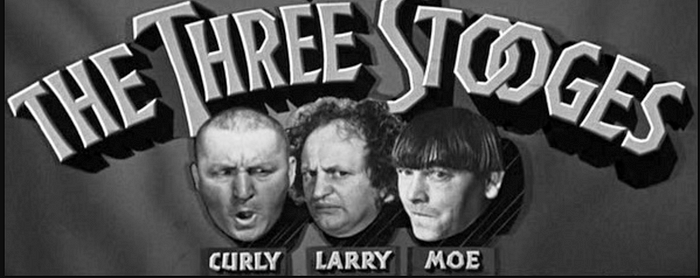The Science of Laughter: Genetics, Evolution, and the Stooges
Written on
Understanding Laughter Through Evolutionary Biology
Recent advancements in decoding the human genome and the rise of evolutionary biology have opened a floodgate of research aimed at unraveling the origins of human behavior. While debates about ethics and the "selfishness" inherent in our DNA continue, one consensus emerges among experts: the cutting edge of research lies in understanding how genetics and evolutionary biology shape our perceptions of iconic comedic figures like the Three Stooges.
Gender Perspectives on The Stooges
Interestingly, there seems to be a notable absence of female fans among the audience of The Stooges. It may seem perplexing, but as scientists clad in lab coats, we can assert this with confidence. The reality is that many women are entirely unaware of the trio's existence. In fact, if you approach a random woman on the street and utter "Nyuk, nyuk, nyuk," there’s a substantial chance—up to 72%—that she will respond with a swift spray of mace.
For those women familiar with The Stooges, the experience is often regrettable. The term "the curse," commonly misunderstood as a euphemism for menstruation, actually refers to the unfortunate reality of having to endure an episode of The Stooges, often at the behest of an older sibling promising a nickel for counting Moe's iconic eye pokes. Many of these women end up requiring therapeutic intervention—a long road to recovery.
To delve deeper into how these women view The Stooges, researchers have developed a hierarchy of importance based on extensive interviews. Recently, a breakthrough discovery identified a specific gene on the male "Y" chromosome associated with gender-based perceptions of The Stooges. This gene, humorously dubbed "knucklehead," also correlates with behaviors like urinating while standing and the preference for watching comedic shows in recliners rather than engaging in more sophisticated activities.
The team behind this discovery is a strong contender for next year's Nobel Prize in Physiology.

Delving into the knucklehead gene, evolutionary biologists propose that it persisted because prehistoric women chose the smartest males for hunting, thereby ensuring the survival of their clans. Those males who exhibited the knucklehead trait—too dim to contribute—remained behind, engaging in eye-poking antics to establish dominance, all in a bid to mate. This mimicry of the black widow spider, which often consumes its partner post-copulation, illustrates how some women may have viewed their male counterparts as the Stooges.
The film "Black Widow" serves as a modern example of this mimicry, where Scarlett Johansson’s character consumes Jeremy Renner during his post-coital slumber, hinting that popular culture sometimes reflects scientific principles.
As the evolutionary necessity for the knucklehead gene fades, it is likely to mutate toward more advantageous behaviors, such as enabling men to act more maturely. Some female scientists, tired of the knucklehead gene's antics, are exploring gene editing to create males who possess the looks of Chris Hemsworth but the comportment of Dr. Fauci.
Roles Within The Stooges
Each Stooge had a defined role: Moe as the leader, though not in a conventional sense; Larry as the violinist and middle child; and Curly as the lovable goofball. Over the near fifty-year history of The Stooges, three other actors filled Curly's shoes, collectively known as Etc.
- Shemp Howard
- Curly Howard
- Shemp Howard (again)
- Joe Besser
- Curly Joe DiRita
To fans, Curly is revered as a comedic deity, while Shemp falls into a less favorable category. The memories associated with the others are often buried deep, with many fans requiring psychological support to cope.
The Humor Hierarchy
Analysis of numerous interviews has led to the construction of a humor hierarchy. Joe Besser, for example, is often described as less funny than even the most mundane mortician. The general consensus is that his comedic attempts are akin to a funeral—grim and unamusing.
Despite attempts to understand why Joe Besser fails to elicit laughter, geneticists have been baffled. Those who ventured to uncover the genetic underpinning of his lack of humor have faced dire consequences, ranging from homelessness to aligning with fringe political groups.
Mimicry and the Stooges
Mimicry, an evolved similarity between species, serves as a survival tactic. Simply adopting Curly's name or appearance will not confer humor; rather, it requires a deeper understanding of comedic timing and physicality—qualities that Shemp lacked.
Curly's unique ability to spin and entertain has been linked to the earliest forms of life, which used similar motions to navigate their environments. This connection underlines the innate human fascination with spinning entities, a trait Curly expertly exploited. Meanwhile, Shemp’s contributions were limited to less engaging activities like whittling.
The Ultimate Showdown: Curly vs. Shemp
In a humorous comparison, Curly’s comedic prowess can be likened to a decisive MMA knockout, while Shemp is more akin to a defeated opponent left sprawling on the ground. Curly’s legacy shines brightly; his antics captivated audiences, while Shemp’s contributions are often overshadowed by the brilliance of his predecessor.
In a world that desperately needs innovative thinkers to advance scientific understanding, perhaps this exploration of humor and genetics will inspire a new generation to consider careers in these fields.
As Curly would say in his most profound moments:
"Why certainly! Woof! Woof!"
Chapter 2: The Impact of Genetics on Humor
This video discusses the intricate relationship between molecular genetics and human humor, shedding light on the genetic factors influencing our sense of humor.
In this introductory lecture, Mohamed Noor explores the fundamentals of genetics and evolution, providing a framework for understanding the biological underpinnings of humor.